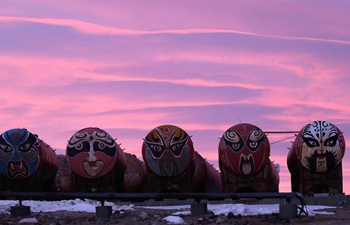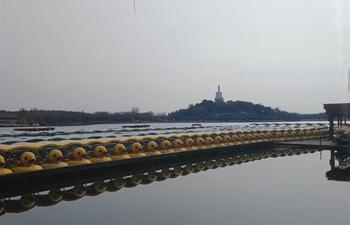JERUSALEM, Feb. 27 (Xinhua) -- A 1,600-year-old mosaic, bearing a rare inscription, was discovered in an ancient Samaritan winepress, as reported Wednesday by the Israel Antiquities Authority.
The winepress, unveiled in the southern Sharon plain in the center of Israel, was probably part of the agricultural heritage of a wealthy Samaritan named Adios.
On the mosaic was written a blessing in the Greek language, "Only God helps to the beautiful property of Master Adios."
The Samaritans are a unique ethnic-religious group that claims to be a direct continuation of the Iron Age Israelites. According to the Samaritan tradition, they are "pure Israelis," part of the Jewish people and carry its true heritage.
The finds date to the beginning of the 5th century CE, when the Samaritan settlement reached its peak in the southern Sharon plain during Byzantine rule in the historic Land of Israel.
Near the winepress were found stone quarries with rock-cut depressions used for cultivating grapevines. The quarries were probably part of Master Adios' inheritance.
According to the archaeologists, a master is an honorary degree given to community officials and attests to the high social status of the owners of the agricultural land.
The location of the winepress, close to a hill top, where remains of a Samaritan synagogue were discovered in the past, attests to the high status of Adios.
The inscription in the winepress joins other findings that show the extensive Samaritan settlement that existed in the area some 1,600 years ago and adds information about their lives in the Byzantine period.
Today there are only 2 small Samaritan communities worldwide - in Mount Gerizim in the West Bank, and in the city of Holon in the center of Israel.

















